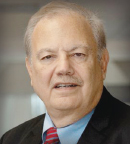The National Foundation for Cancer Research (NFCR) announced that the blue-ribbon selection committee, composed of world-renowned research leaders and visionaries, has awarded the 2024 Szent-Györgyi Prize for Progress in Cancer Research to Dennis J. Slamon, MD, PhD, of UCLA Health, for his groundbreaking research discoveries that helped to shape the field of precision medicine for patients with breast cancer.
The cancer research community will celebrate Dr. Slamon and his accomplishments on October 18, 2024, at the Szent-Györgyi Prize Dinner and Award Ceremony, taking place during NFCR's Global Summit and Award Ceremonies for Cancer Research and Entrepreneurship in Washington, DC, at The National Press Club.

Dennis J. Slamon, MD, PhD
"I am truly honored and humbled to be selected by the committee for the coveted Szent-Györgyi Prize," said Dr. Slamon. "From bench to bedside, my mission from day one has always been to improve the lives of cancer patients. To be recognized by my peers and awarded this prize by the NFCR is a defining moment for me and will serve as inspiration to continue my research, fight for patients, and continue to challenge conventional thinking by consistently redefining what's possible as it relates to medical and treatment advancements against cancer."
Dr. Slamon’s Research
For decades, Dr. Slamon has relentlessly focused on pioneering cancer research and the development of novel therapies for breast cancer. In 1987, he discovered that the amplification of the growth-promoting HER2 gene led to the pathologic overexpression of the gene product and its association with 25% to 30% of human breast cancer cases. This alteration—a noninherited mutation—defined a new subtype of breast cancer.
Throughout the 1980s and 1990s, there was much resistance to Dr. Slamon's research, as it represented a completely new way of thinking. Previously, cancers from the same organ with similar histology were presumed to be—and largely treated as—the same. His work showed that pathogenic molecular mechanisms could differ in cancers yet look the same under the microscope.
With unwavering determination and persistence, Dr. Slamon then demonstrated that antibodies targeting the HER2 receptors inhibited the growth of the cells in vitro and in vivo. Dr. Slamon played an instrumental role in the clinical development of HER2-targeted antibodies, from preclinical studies to the proof-of-concept early clinical work to the eventual U.S. Food and Drug Administration approval of trastuzumab. Since trastuzumab’s approval in 1998, it has been used to treat nearly 3 million patients with HER2-positive breast cancer worldwide.
Dr. Slamon's therapeutic approach has completely reversed the natural history of HER2-positive breast cancers for patients with the worst to those with the best prognosis. Based on lessons from trastuzumab, he created a new paradigm of thinking for developing new cancer treatments. Targeting the molecular mechanism, not the histology, became the basis for most new cancer treatments across many cancer types.
Another significant discovery by Dr. Slamon revealed that estrogen receptor–positive, HER2-negative breast cancers—which account for 65% of breast cancer diagnoses—are uniquely sensitive to inhibitors of enzymes crucial to cell division, the cyclin-dependent kinases (CDK) 4 and 6. This discovery and his translational research led to clinical trials and the 2015 approval of the initial targeted inhibitor of CDK4/6, palbociclib, significantly improving the prognosis for the most common type of high-risk breast cancer.
To this day, Dr. Slamon continues to investigate mechanisms of resistance to HER2-targeted therapies and is investigating the biology of other breast cancer subtypes for clinical translation.
Chair of the 2024 Selection Committee and 2023 Szent-Györgyi Prize Winner, Isaac Witz, PhD, remarked, “I can think of none finer to receive the 2024 Szent Györgyi Prize than Dr. Slamon. The scientific and medical advances he has made for women with breast cancer have created a new paradigm for treatment options and resulting survival rates. I have known of Dr. Slamon’s research for some time and have sincerely admired his approaches, how he thinks differently than others in the field, and his tenacity to tackle the clinical trial process head-on to produce results for patients.”
Sujuan Ba, PhD, NFCR's President and Chief Executive Officer and the Co-Chair of the 2024 Szent-Györgyi Prize Selection Committee, added, "Dr. Slamon epitomizes our vision of a Szent-Györgyi Prize winner. One of my favorite quotes from our co-founder Albert Szent-Györgyi is ‘to see what others have seen but to think differently than anybody else has thought.’ Dr. Slamon has done just this through his research around the amplification of the HER2 gene, which shed even more light on cancer being a genetic disease and paved the way for a completely new set of targeted treatments for breast cancer patients. Over time, as his research produced more and more positive results…, many of his research and medical peers began to adopt the viewpoint of ‘breast cancer before Dennis and after Dennis.’ We could not be more proud to have Dr. Slamon as our 2024 Szent-Györgyi Prize winner.”
Current Roles and Education
Currently, Dr. Slamon serves as Director of Clinical/Translational Research and as Director of the Revlon/UCLA Women's Cancer Research Program at the Jonsson Comprehensive Cancer Center. He is a Professor of Medicine, Chief of the Division of Hematology/Oncology, and Executive Vice Chair for Research for UCLA's Department of Medicine. Dr. Slamon also serves as Director of the medical advisory board for the National Colorectal Cancer Research Alliance.
A 1975 honors graduate of the University of Chicago's Pritzker School of Medicine, Dr. Slamon earned his PhD in cell biology that same year. He completed his internship and residency at the University of Chicago Hospitals and Clinics, becoming chief resident in 1978. One year later, he became a fellow in the Division of Hematology/Oncology at UCLA.
In acknowledgement of his accomplishments, President Clinton appointed Dr. Slamon to the three-member President's Cancer Panel in June 2000.

